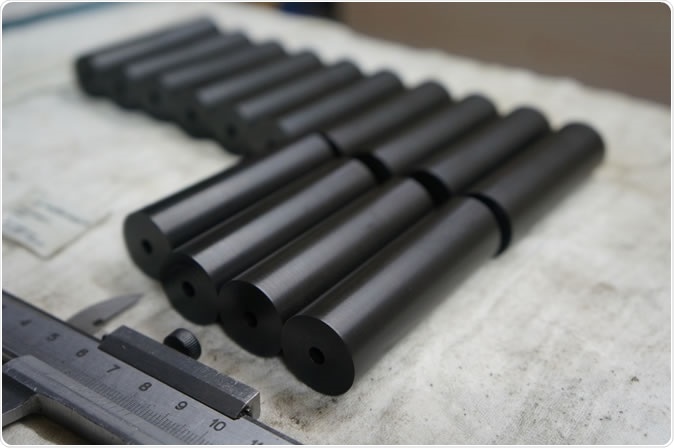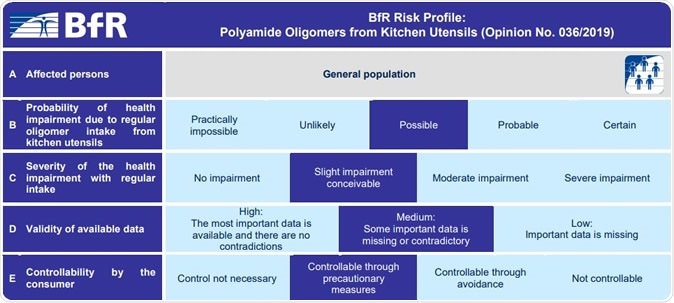Polyamides are plastic polymers, built up from monomers or identical building blocks assembled in a repeating pattern. During this process, some shorter chains, or oligomers, are produced inadvertently. These remain in the plastic material. The problem arises when the plastic is used to make a food dish, because if the food is hot, the oligomers try to escape from the heated plastic – possibly into the food.

Polyamide parts on a lathe. Image Credit: Tokarishka / Shutterstock
A new opinion piece from the German Federal Institute For Risk Assessment (Bfr) warns consumers to keep hot food out of contact with utensils made from polyamides of two kinds, namely, PA 6 from caprolactam monomers, and PA 6,6 from two monomers, adipic acid and hexamethylenediamine. These include cooking spoons, whisks and spatulas.
The opinion piece that recently appeared in the BfR says that oligomers in the form of chemical rings can migrate from these plastic utensils into food. There is a lack of experimental data on the toxic effects of these oligomers, so the scientists used a concept called “threshold of toxicological concern” on which basis they estimated the risk to health. According to this concept, a substance whose toxicity is unknown is classified by its chemical structure into one or other Cramer classes, each of which has a maximum daily intake already assigned, below which toxicity is unlikely in humans. The Cramer decision tree was proposed by Cramer et al. in 1978, and assigns all organic chemicals into one of three classes (I – low, II – intermediate and III – high) to show the chances of toxicity with each class.

In the present case, the oligomers of both types are in Cramer Class III, which means a maximum allowable daily intake of 90 micrograms for an individual with a body weight of 60 kg.
Prior data from the period 2016-17 reveals the possibility of much higher amounts of PA migration into food. Based on this, the opinion piece advises manufacturers of such food contact materials to obtain toxicological data in conformity with the European Food Safety Authority (EFSA), which should be made available to the BfR. Some manufacturers have already provided data from various studies on the toxicity of cyclic or ring-shaped PA compounds to the BfR.
This new information has prompted a group approach to toxicity evaluation of PA 6 and PA 6,6, the first in oligomers of 2-8 units, and the second in oligomers of 1-4 units. These compounds are labeled as being nontoxic to the genome, or DNA. However, in large amounts, they may damage the liver and the thyroid via their metabolic products. As a result, the BfR has set a limit of 5mg/kg of food for these compounds as a group, as the amount which is permitted to migrate into food within toxicity limits. The European Plastics Regulation (EU) No. 10/2011 assumes an adult exposure to one kilogram of food that has come into contact with food contact material every day.
The group migration value of the cyclic oligomers of PA compounds from kitchen utensils was below the 5 mg/kg limit for 23/33 utensils, in 2016-17, while for the remaining 10 items, it crossed this limit. The BfR therefore recommends optimization of manufacturing processes when making kitchen utensils from PA polymers, to ensure that as little of the oligomers migrate as possible. Moreover, the advice to consumers is to minimize contact between food and polyamide utensils, especially if the temperature is above 70 °C.
Journal reference:
www.bfr.bund.de. Polyamide kitchen utensils: Keep contact with hot food as brief as possible. BfR Opinion No. 036/2019 of 17 September 2019. DOI 10.17590/20191025-145320. https://www.bfr.bund.de/cm/349/polyamide-kitchen-utensils-keep-contact-with-hot-food-as-brief-as-possible.pdf